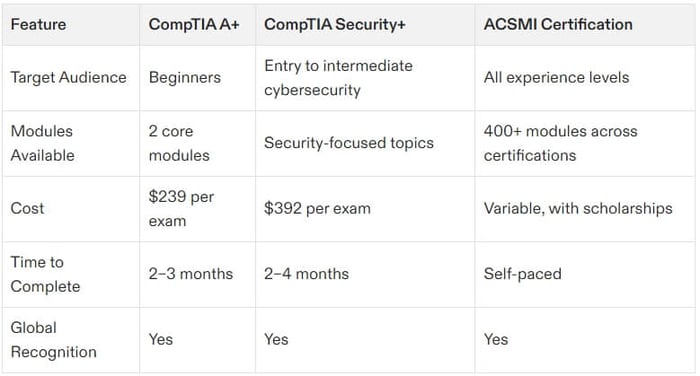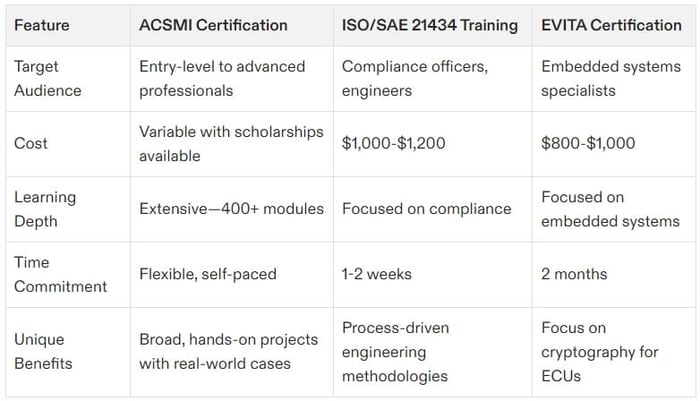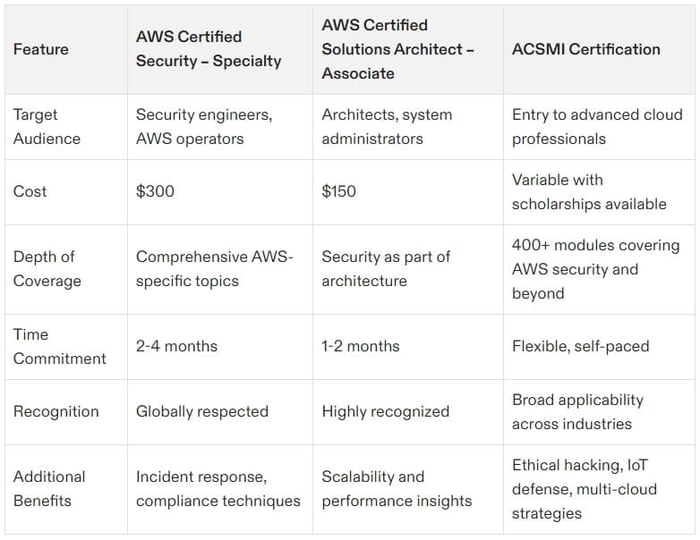Table of Contents
- Why Are Cybersecurity Certification Practice Exams Crucial?
- 1. Familiarize Yourself With Exam Format
- 2. Identify Knowledge Gaps
- 3. Boost Confidence Under Pressure
- 4. Improve Time Management
- 5. Increase Success Rates
- Key Tips for Using Cybersecurity Certification Practice Exams Effectively
- Top Platforms for Cybersecurity Certification Practice Exams
- Choosing the Right Platform
- ACSMI Certification With 400+ Modules
- Final Thoughts
- Frequently Asked Questions (FAQs)
Earning a recognized cybersecurity certification is a career-defining achievement that can open doors to advanced opportunities. However, passing these rigorous exams requires more than just studying materials; it requires discipline, strategy, and most importantly, the right kind of practice. A cybersecurity certification practice exam is an essential tool to help you excel in certifications like CISSP, CompTIA Security+, or CEH.
Why Are Cybersecurity Certification Practice Exams Crucial?
Cybersecurity practice exams are an indispensable part of your exam preparation strategy. Here’s why incorporating practice exams into your study routine is crucial for success:
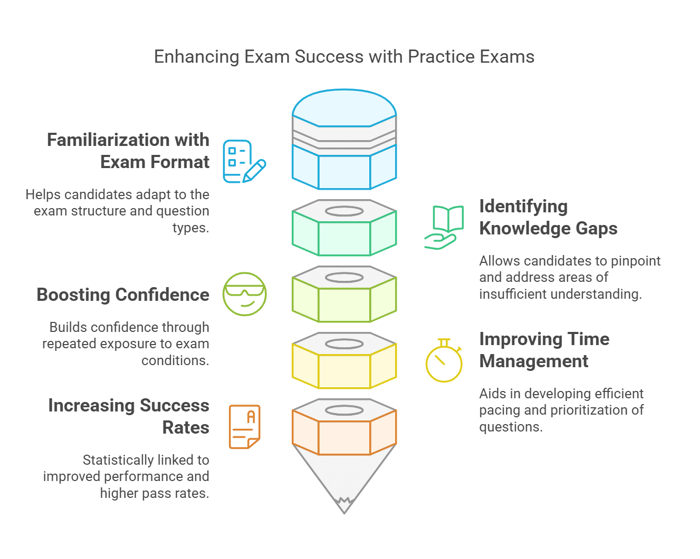
1. Familiarize Yourself With Exam Format
Certification exams like CISSP or CISM can feel intimidating, especially if it’s your first time sitting for them. Practice exams help replicate the real exam environment by exposing you to the exam format, question types, and time constraints. This simulation ensures that you’re not only familiar with the content but also with the structure of the exam, making you more comfortable when it’s time for the real thing.
2. Identify Knowledge Gaps
Cybersecurity certifications often cover vast amounts of information, and it's easy to miss key concepts during your studies. Practice exams give you a chance to identify any gaps in your knowledge. Whether it’s cloud architecture, advanced threat management, or other specialized topics, practice exams help pinpoint areas where your understanding may be lacking. Recognizing these gaps early allows you to adjust your study focus, ensuring that you cover all the necessary material before the exam.
3. Boost Confidence Under Pressure
Many candidates experience test anxiety during high-stakes exams. Repeated exposure to practice exams helps you become accustomed to the pressures of exam day. By simulating test-like conditions, you will boost your confidence and mental preparedness. The more you practice, the more comfortable you’ll feel tackling questions under pressure, which is critical for exam success.
4. Improve Time Management
Time management is a common challenge when preparing for certification exams. Practice exams help you hone your pacing and ensure you can complete each section within the allotted time. As you work through practice exams, you’ll learn to read questions efficiently, prioritize answers, and avoid getting stuck on particularly challenging questions, all of which contribute to finishing within the time constraints.
5. Increase Success Rates
Test-takers who incorporate practice exams into their preparation perform significantly better than those who don’t. Statistically, practicing with mock exams can improve your score by familiarizing you with both the content and the exam flow. The more you understand the format and types of questions, the higher your chances of acing the exam. It’s not just about what you know, but how you apply that knowledge under exam conditions.
Key Tips for Using Cybersecurity Certification Practice Exams Effectively
To get the most out of your practice exams, here are some tips on how to integrate them effectively into your study routine:
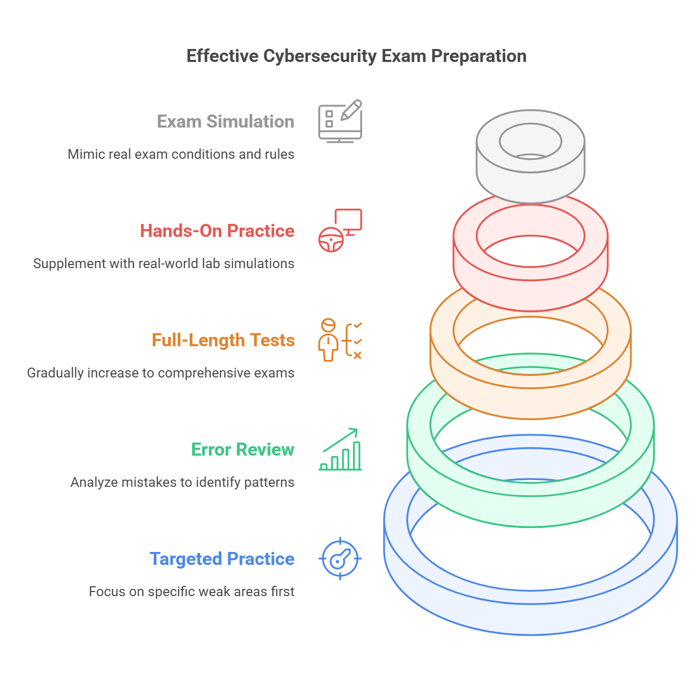
1. Start With Targeted Practice
After gaining foundational knowledge, dive into topic-specific practice exams. These will help you target specific areas that you may struggle with. This focused approach allows you to solidify your understanding of key concepts before progressing to full-length tests. As you become more comfortable with specific topics, you can gradually work up to more comprehensive practice exams.
2. Review Errors Thoroughly
Mistakes are part of the learning process. After completing a practice exam, take the time to review your incorrect answers. Don’t just note the correct answers—understand why you got them wrong. Look for patterns in your errors, whether they're related to specific topics, question types, or time management. Revisiting related study materials will help reinforce your understanding and minimize mistakes in the future.
3. Take Full-Length Tests Closer to the Exam Date
Start with short, topic-specific tests early in your preparation, and as you get closer to your certification exam date, transition to full-length practice exams. Simulating the full duration of the exam helps you build mental stamina and develop strategies to manage your time effectively during the real exam. By practicing for longer periods, you’ll become better at managing fatigue and staying focused throughout the test.
4. Combine Theory With Hands-On Practice
While practice exams focus on testing your theoretical knowledge, real-world expertise comes from hands-on experience. To gain a well-rounded understanding of cybersecurity, supplement your practice exams with hands-on lab simulations. Platforms like ACSMI provide a rich array of practical labs that simulate real-world scenarios in ethical hacking, incident response, and more. Combining both theory and practice will prepare you to handle real cybersecurity challenges.
5. Simulate Real-Exam Conditions
To build authentic readiness, complete practice exams in environments that mimic the actual testing center. Avoid distractions, set a timer, and follow the exam’s pace and rules. This will not only help you become accustomed to the pressure but also improve your ability to stay focused and manage your time efficiently during the real exam.
Top Platforms for Cybersecurity Certification Practice Exams
Choosing the right platform for your cybersecurity certification practice exams is just as important as mastering the study material itself. The ideal platform will enhance your confidence, reinforce key concepts, and help fill in knowledge gaps. Below are five top platforms that cater to various levels of cybersecurity professionals.
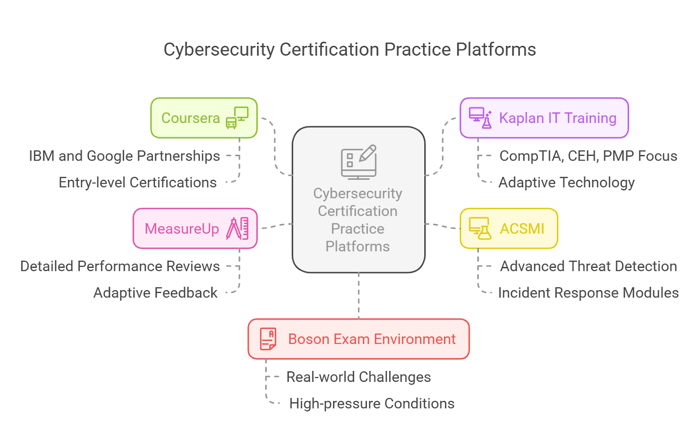
1. Coursera
Coursera is a beginner-friendly platform that provides quizzes and mock exams as part of various cybersecurity courses. Partnering with major tech companies like IBM and Google, Coursera offers courses that are widely recognized by industry professionals.
Best For: Beginners or mid-level professionals aiming for entry-level certifications like CompTIA Security+ or Google IT Support.
Unique Features: Coursera blends video lectures with interactive quizzes, peer feedback, and career resources such as resume building and interview preparation.
2. Kaplan IT Training
Kaplan offers high-quality practice tests specifically designed for certifications like CompTIA, CEH, and PMP. The platform includes in-depth explanations of answers, helping users understand the reasoning behind correct and incorrect responses.
Best For: Mid-career professionals aiming for specialized certifications.
Unique Features: Kaplan’s adaptive technology personalizes your study path, focusing on areas where you need improvement. Their timed simulations mimic the real pressure of exam conditions.
3. ACSMI
ACSMI is ideal for those looking for a combination of theoretical knowledge and hands-on practical experience. The platform provides more than 400 modules that cover a wide range of cybersecurity topics, including advanced threat detection and incident response.
Best For: Aspiring professionals preparing for advanced certifications like CISSP, OSCP, or CISM.
Unique Features: ACSMI offers practical labs and simulations that closely mirror real-world cybersecurity environments. This hands-on experience gives you a competitive edge, especially if you're preparing for high-level roles like penetration testers or SOC analysts.
4. MeasureUp
For professionals aiming for advanced certifications such as CISSP or CCSP, MeasureUp provides rigorous practice tests that simulate the real exam environment. The platform offers detailed performance reviews, helping you assess your readiness in great detail.
Best For: Advanced-level professionals or those seeking high-stakes certifications.
Unique Features: MeasureUp’s adaptive feedback helps you focus on weak spots by offering varying difficulty levels and detailed performance reviews.
5. Boson Exam Environment
Boson offers superior exam simulations designed for experienced cybersecurity professionals. Their practice exams focus on real-world cybersecurity challenges, making them ideal for seasoned experts preparing for certifications that require applied problem-solving, such as CEH or AWS Security.
Best For: Advanced professionals preparing for challenging certifications.
Unique Features: Boson’s virtual exam interface closely mimics official testing environments, allowing you to practice in realistic, high-pressure conditions.
Choosing the Right Platform
Each of the platforms mentioned above caters to different certification levels and learning styles. Whether you’re just starting with basic practice tests on Coursera or exploring advanced lab simulations on ACSMI, a mix of these resources can enhance your study routine. Combining targeted practice exams with interactive learning and hands-on labs ensures that you’re not just prepared for the exam but also ready to face real-world cybersecurity challenges.
ACSMI Certification With 400+ Modules
ACSMI provides an invaluable resource for hands-on experience through its 400+ modules, which range from beginner to advanced levels. Whether you're working toward an entry-level certification or preparing for an advanced role, ACSMI’s comprehensive training ensures you're fully prepared.
Final Thoughts
Preparing for a cybersecurity certification requires strategic planning, focus, and the right tools. Cybersecurity certification practice exams are a crucial part of your preparation process. They help build your confidence, address knowledge gaps, and ensure you're exam-ready.
For an enhanced preparation experience, combine practice exams with hands-on training platforms like ACSMI, which provide immersive modules to supplement your study plan. Whether you're aiming for an entry-level certification or preparing for an advanced credential, the right combination of theory, practice, and real-world learning will ensure your success.
Start your preparation today and take the next step toward becoming a leading cybersecurity professional.
Frequently Asked Questions (FAQs)
What is a cybersecurity certification practice exam?
A cybersecurity certification practice exam is a simulated test designed to replicate actual certification exams. These practice exams help you get familiar with the format, time constraints, and question types you’ll face during the real exam.
How are practice exams different from study guides?
Study guides help you learn the material, while practice exams test your understanding in a simulated exam setting. Both are essential in preparation, but practice exams provide the critical exam-like experience you need to improve your performance.
Can I rely solely on practice exams for preparation?
No, practice exams should be used in conjunction with study guides, hands-on labs, and other resources. The combination of theoretical knowledge and practical experience is essential for comprehensive exam readiness.
Where can I find free cybersecurity certification practice exams?
Platforms like Coursera and Kaplan IT Training occasionally offer free quizzes and trial tests. However, always ensure that these practice exams align with your specific certification goals to ensure effective preparation.
How do ACSMI modules supplement my practice exam prep?
ACSMI’s hands-on labs offer real-world experience in cybersecurity topics, complementing the knowledge gained through practice exams. These modules provide practical skills that practice exams alone may not cover, making you job-ready for advanced roles.



